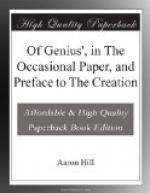You cou’d never have been born at a Time, which more wanted the Influence of your Example: All the Fire you bring with you, and the Judgment you are acquiring, in the Course of your Journey, will be put to their full stress, to support and rebuild the sinking Honours of Poetry.
It was a Custom, which prevail’d generally among the Ancients, to impute Celestial Descent to their Heroes; The Vanity, methinks, might have been pardonable, and rational, if apply’d to an Art; since Arts, when they are at once delightful and profitable, as you will certainly leave Poetry, have one real Mark of Divinity, they become, in some measure, immortal. And as the oldest, and, I think, the sublimest Poem in the World, is of Hebrew Original, and was made immediately after passing the Red-Sea, at a Time, when the Author had neither Leisure, nor Possibility, to invent a new Art: It must therefore be undeniable, either that the Hebrews brought Poetry out of Egypt, or that Moses receiv’d it from God, by immediate Inspiration. This last, being what a Poet should be fondest of believing, I wou’d fain suppose it probable, that God, who was pleas’d to instruct Moses with what Ceremony he wou’d be worship’d, taught him also a Mode of Thinking, and expressing Thought, unprophan’d by vulgar Use, and peculiar to that Worship. God then taught Poetry first to the Hebrews, and the Hebrews to Mankind in general.
But, however this may have been, there is, apparently, a divine Spirit, glowing forcibly in the Hebrew Poetry, a kind of terrible Simplicity; a magnificent Plainness! which is commonly lost, in Paraphrase, by our mistaken Endeavours after heightening the Sentiments, by a figurative Expression; This is very ill Judg’d: The little Ornaments of Rhetorick might serve, fortunately enough, to swell out the Leanness of some modern Compositions; but to shadow over the Lustre of a divine Hebrew Thought, by an Affectation of enliv’ning it, is to paint upon a Diamond, and call it an Ornament.
It is a surprizing Reflection, that these noble Hebrew Poets shou’d have written with such admirable Vigour three Thousand Years ago; and that, instead of improving, we should affect to despise them; as if, to write smoothly, and without the Spirit of Imagery, were the true Art of Poetry, because the only Art we practise. It puts me in Mind of the famous Roman Lady, who suppos’d, that Men had, naturally, stinking Breaths, because she had been us’d to it, in her Husband.
The most obvious Defect in our Poetry, and I think the greatest it is liable to, is, that we study Form, and neglect Matter. We are often very flowing, and under a full Sail of Words, while we leave our Sense fast aground, as too weighty to float on Frothiness; We run on, upon false Scents, like a Spaniel, that starts away at Random after a Stone, which is kept back in the Hand, though It seem’d to fly before him. To speak with Freedom on this Subject, is a Task of more Danger than Honour; for few Minds have




